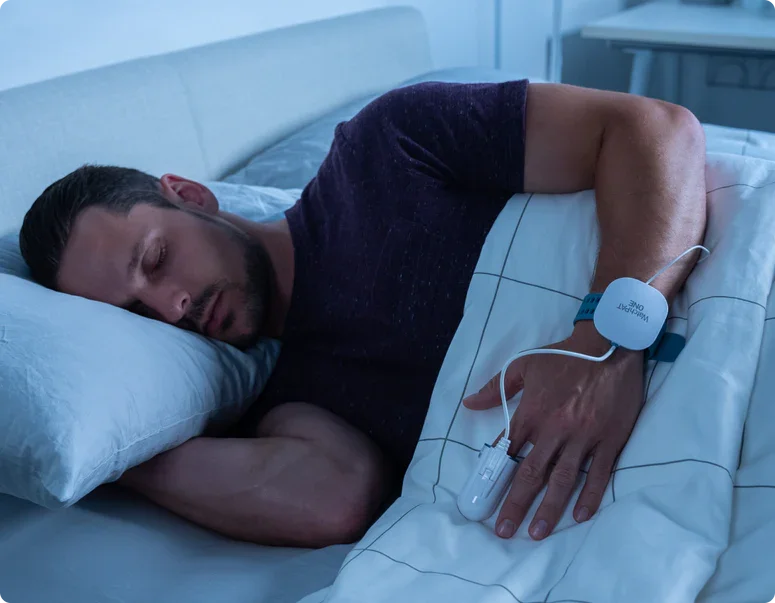
Can You Die From Sleep Apnea?
Learn how untreated sleep apnea puts you at risk with an At-Home Sleep Test.

1. Sleep apnea can lead to serious health problems
Untreated obstructive sleep apnea (OSA) can increase your risk of chronic health conditions, including cardiovascular disease, type 2 diabetes, liver disease, pulmonary hypertension, and kidney disease.

2. Sleep apnea can disrupt your daily life
Not getting treatment for OSA can affect nearly every part of daily life, raising the risk of accidents from daytime drowsiness, impairing memory and concentration, disrupting mood and emotional regulation, and contributing to sexual health problems like reduced libido and erectile dysfunction.

3. Sleep apnea is linked to dangerous heart arrhythmias
Though rare, untreated or severe OSA can increase the likelihood of abnormal electrical activity in the heart (arrhythmias) and sudden cardiac death.

4. Central sleep apnea can raise the risk of sudden death
For people with heart failure, having central sleep apnea (CSA) is associated with a higher risk of mortality and may increase the risk of dying suddenly during sleep.

When to talk to your doctor about sleep apnea
Talk with a doctor if you, your bed partner, or your roommate notice any of the following sleep apnea symptoms:
- Loud snoring or choking, snorting, or gasping for air during sleep
- Excessive daytimes sleepiness
- Morning headaches
- Trouble staying asleep
- Frequently using the bathroom at night
This Year, Fix Your Sleep First
Sleep Doctor offers an easy, stress-free, At-Home Sleep Test so get the answers you need to start fresh
This test was very easy to use.It was not difficult to sleep with the equipment on, even as alight sleeper.
At-Home Sleep Study
An FDA-cleared, 98% accurate, disposable sleep apnea test that accurately measures key sleep metrics to diagnose you in the comfort of your own home.
Test your sleep at home and get a free sleep coaching program
A diagnosis can reveal your specific sleep issue and lay out a path to better sleep, quickly
Review your results and treatment options 1:1 with a licensed care provider
This product requires a prescription before shipment

Product details
This is a disposable sleep apnea test you may administer at home that consists of finger, wrist, and chest sensors that monitor seven different metrics associated with obstructive sleep apnea (OSA). The test can determine whether you qualify for an OSA diagnosis after just one night.
- Chest, wrist, and finger sensors measure peripheral arterial tone, heart rate, blood oxygen, actigraphy, body position, snoring, and chest motion.
- Testers will receive an AHI (apnea hypoxia index) score in their follow-up email.
- Those who meet diagnostic criteria for OSA after testing may be prescribed PAP therapy.
- Unopened tests may be returned within 60 days.
How does it work?
To receive the test, you will need to submit an assessment form to determine if you meet the diagnostic criteria for a prescription. If the test and physician reviewer confirm you have OSA, you’ll meet with a licensed respiratory therapist to discuss treatment and other follow-up steps. The test is made for one-time use and is only approved for patients aged 18 and older.
Shipping and returns
Shipping:
Shipping is free within the continental United States (except for Alaska, Hawaii, Puerto Rico, Guam, Virgin Islands). Sleep Doctor will not ship products internationally. All applicable shipping options will be displayed at time of checkout.
If you have ordered a Home Sleep Test device, the order will be sent through USPS Priority Mail and should reach you within 3 business days.
Return Policy:
We want you to be completely satisfied with your purchase, so we offer a 60-night return option from the date of delivery and a partial refund. To be eligible for a return, the product must be in new and unopened condition. Please note that you are responsible for return shipping, and expedited shipping costs are non-refundable. Refunds may take up to 10 business days to process.

Frequently asked questions
Will the Home Sleep Test cause sleep problems?
Some people who take our Home Sleep Test experience anxiety during the night, which can make it hard to fall asleep and lead to inaccurate results. However, we're confident you'll be more comfortable and relaxed in your own bed than if you participated in an overnight sleep study at a sleep center.
For most people, the test can gather enough information after one night, even if you're nervous and experience sleep disruptions. If you sleep 2.5 hours or less, you should consider retaking the test.
What does the device measure?
The Home Sleep Test features a wrist sensor, pulse oximeter, and chest sensor. The device uses three points of contact — the wrist, finger, and neck — to collect data for seven key sleep apnea metrics.
The device measures central and obstructive sleep apnea events, true sleep time, snoring, breathing rates, oxygen saturation levels, heart rate, your body's position, and how much time you spend in each sleep stage.
Designed for comprehensive results, our Home Sleep Test helps your doctor make an informed diagnosis and therapy recommendations. The device's sensors send data directly to a doctor via your cell phone's Bluetooth.
Do I need a prescription for sleep apnea therapy?
CPAP machines and masks are federally regulated medical devices in the United States, so you'll need a prescription for these components — both of which are essential for CPAP therapy. You can obtain a prescription by completing a sleep study or test, then receiving a sleep apnea diagnosis from a board-certified physician.
Can you die in your sleep from obstructive sleep apnea?
Struggling with sleep? Our Home Sleep Test identifies issues and guides treatment.

References
- https://www.uptodate.com/contents/clinical-presentation-and-diagnosis-of-obstructive-sleep-apnea-in-adults
- https://medlineplus.gov/ency/article/000811.htm
- https://www.uptodate.com/contents/clinical-presentation-and-diagnosis-of-obstructive-sleep-apnea-in-adults
- https://www.uptodate.com/contents/pulmonary-hypertension-due-to-lung-disease-and-or-hypoxemia-group-3-pulmonary-hypertension-epidemiology-pathogenesis-and-diagnostic-evaluation-in-adults
- https://pubmed.ncbi.nlm.nih.gov/23674930/
- https://www.uptodate.com/contents/sleep-disorders-in-end-stage-kidney-disease
- https://pubmed.ncbi.nlm.nih.gov/26847976/



















